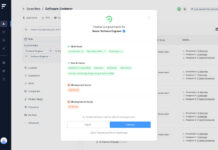
An increasing number of HR practitioners are schooling themselves on the workings of artificial intelligence, even though many HCM technology buyers say they’d rather hear about a product’s effectiveness than the goings-on under the hood.
According to a report from HR.com, The State of Artificial Intelligence in HR, 43 percent of HR pros said they were knowledgeable about AI, up from 36 percent in 2017. The percentage who said they were “unknowledgeable” dropped from 35 to 29.
43 percent of #HR pros say they're knowledgeable about #AI, up from 36 percent in 2017. #HR #HRTech @HRdotcom Share on XMeantime, more employers are using AI-driven tools as part of their HCM technical stack, the report said. The number of companies using AI to a high or very high degree rose to 10 percent from 7 percent last year. Nearly half, 46 percent, expect to see high or very high usage by 2024.
More than 80 percent of HR professionals want to put AI to use with analytics and metrics. That was followed by talent acquisition (64 percent), training and development (55 percent), time and attendance (54 percent), and performance management (53 percent). The survey didn’t specify exactly what use “analytics and metrics” would be put to, which indicates there may be some overlap in the results. However, HR.com said it believed “this is because analytics is a natural AI strength and because it can be applied across many HR functions.”
AI is Hyped? Really?
In the past, we’ve argued that AI in HR may be as much about the cognoscenti’s hype as it is real usefulness. In fact, several analysts and data scientists have told us the term “artificial intelligence” is a misnomer. “There isn’t any AI in HR currently and it may be a hundred years before there’s AI in HR,” said one. “What’s in the market today boils down to complicated regression analysis expressed as probabilities of this happening or that happening.”
In other words, what people today call artificial intelligence is closer to advanced math.
HR.com’s report notes that, in general, AI is riding a wave of hype from both futurists and vendors. That make being knowledgeable about advanced technology all the more important, it suggests, because HR professionals must be able to recognize quality—or lack of it—in products pitched as “powered by AI.”
The survey also found a large number of HR professionals—60 percent—believe employees will one day take direction from AI mechanisms. However, it may be that AI is poised to take over the administrative components of management, not the softer responsibilities such as team leadership and people management.
When it comes to AI’s role in people management, HR professionals “have mixed or even conflicted feelings,” the report said. Still, the number of comfortable with the idea rose.
Asked about AI tools that might track employee activity on digital devices, analyze the results and deliver summaries and recommendations to supervisors, 18 percent loved the idea (up from 7 percent in 2017), 46 percent liked the idea but had reservations (up from 35 percent), 26 percent disliked the idea but thought it had some merits (down from 38 percent) and 9 percent detested the idea (down from 18 percent).
HR.com’s findings align with a recent Oracle study that found practitioners are surprisingly comfortable with advanced analytics capabilities. About half said they could use prescriptive and predictive analytics. However, Oracle also found that executives are skeptical about HR’s analytics skills. They believe HR is more likely to use more basic descriptive or diagnostic data.
Oracle proposed two theories to explain the disconnect: First, HR isn’t as familiar as it thinks with sophisticated analytics. An alternative: HR professionals are smitten by the surge of data and data technology that’s rushed into their department over the last several years.
Sign up for our newsletter here.
Image: iStock















